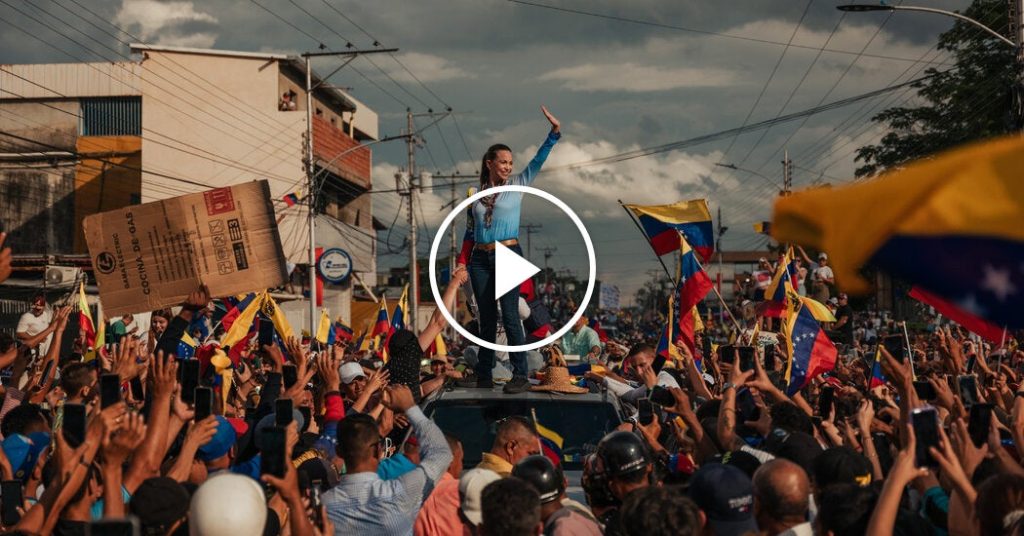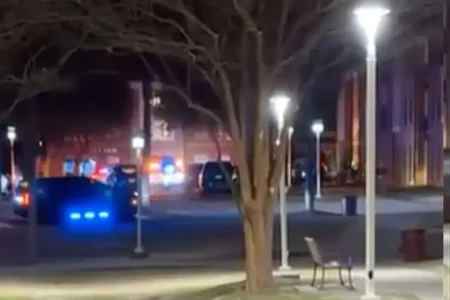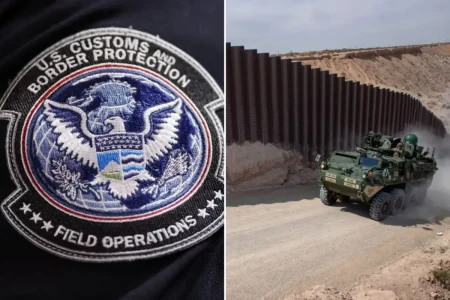Venezuela’s María Corina Machado Awarded 2025 Nobel Peace Prize: Champion of Democracy Amid Authoritarian Rule
In a powerful recognition of her unwavering commitment to democratic principles, Venezuelan opposition leader María Corina Machado has been named the recipient of the 2025 Nobel Peace Prize, honoring her courageous stand against authoritarianism.
By International Affairs Desk | October 10, 2025
A Voice for Democracy in the Face of Repression
The Norwegian Nobel Committee announced today that Venezuelan opposition leader María Corina Machado has been awarded the 2025 Nobel Peace Prize for her extraordinary commitment to democratic principles in a country gripped by political turmoil. “She is receiving the Nobel Peace Prize for her tireless work promoting democratic rights for the people of Venezuela, and for her struggle to achieve a just and peaceful transition from dictatorship to democracy,” stated the committee in their announcement from Oslo. Machado, currently living in exile after being forced to flee her homeland, has emerged as the most prominent voice challenging President Nicolás Maduro’s increasingly authoritarian regime. Her advocacy has resonated deeply with millions of Venezuelans suffering under economic collapse, political repression, and humanitarian crisis. Despite facing intimidation, legal persecution, and ultimately exile, Machado has maintained a steadfast commitment to non-violent resistance and constitutional means of political change—principles that align precisely with the Nobel Peace Prize’s mission of recognizing those who advance peaceful solutions to conflict.
When contacted about the honor, Machado responded with characteristic humility: “Oh my God. Well, I have no words. Thank you so much. But I hope you understand this is a movement. This is an achievement of a whole society. I am just one person. I certainly do not deserve this.” This statement reflects Machado’s consistent messaging throughout her political career—emphasizing collective action over individual leadership and positioning herself as merely one voice among millions of Venezuelans yearning for democratic governance. International observers note that this recognition comes at a critical juncture in Venezuela’s political struggle, as Machado continues to galvanize opposition forces despite being physically separated from her supporters. The Nobel Committee’s decision sends a powerful message about the importance of defending democratic norms globally at a time when authoritarianism is on the rise in various regions.
The Journey from Politician to Symbol of Resistance
Machado’s transformation from a congresswoman to an international symbol of democratic resistance reflects Venezuela’s turbulent political journey over the past decade. With a background in civil engineering and a career that began in Venezuela’s private sector, Machado first gained national prominence as a legislator known for her direct confrontations with former President Hugo Chávez. After being stripped of her parliamentary seat in 2014—a move widely condemned by human rights organizations as politically motivated—she redirected her energy toward grassroots organizing and coalition-building among fragmented opposition groups. Despite being barred from holding public office through controversial legal maneuvers by the Maduro administration, Machado continued her political activities, eventually emerging as the de facto leader of Venezuela’s pro-democracy movement. Her ability to unite diverse opposition factions under a single banner represented a significant threat to Maduro’s grip on power, ultimately leading to government persecution that forced her into exile.
What distinguishes Machado from previous opposition leaders has been her strategic emphasis on building a broad-based movement that transcends traditional political divides. Rather than focusing exclusively on elite politics in Caracas, she undertook extensive tours of Venezuela’s most impoverished regions—areas that had once been strongholds of support for the ruling socialist party. There, she connected the country’s economic collapse directly to governmental corruption and mismanagement, challenging the regime’s narrative that international sanctions were solely responsible for Venezuela’s humanitarian crisis. “When history looks back at this dark period in Venezuela, María Corina Machado will be remembered as someone who chose the difficult path of principled resistance when compromise or surrender would have been easier options,” noted Dr. Elena Sanchez, a political scientist specializing in Latin American democracy movements at Georgetown University. This combination of moral clarity and strategic pragmatism has earned Machado respect even from political opponents, with many former government supporters privately acknowledging her courage in standing against an increasingly repressive state apparatus.
Venezuela’s Crisis and the International Response
The Nobel Committee’s decision to honor Machado comes against the backdrop of Venezuela’s deepening humanitarian emergency—widely considered among the worst in the Western Hemisphere’s modern history. Once Latin America’s wealthiest nation due to vast oil reserves, Venezuela has experienced an economic collapse of historic proportions under Maduro’s leadership. Hyperinflation reached over 130,000% at its peak, decimating savings and making basic necessities unaffordable for most citizens. An estimated 7.7 million Venezuelans—approximately one-quarter of the population—have fled the country since 2014, creating one of the world’s largest refugee crises. Meanwhile, those who remain face chronic shortages of food, medicine, and essential services, with the healthcare system on the brink of collapse. Public institutions have been systematically weakened, with the judiciary and electoral authorities firmly under government control, eliminating meaningful checks and balances on executive power.
The international community has responded with increasing concern to Venezuela’s deterioration, though often divided along geopolitical lines. The United States, European Union, and most Latin American democracies have recognized Machado’s democratic mandate following disputed elections, imposing targeted sanctions against regime officials accused of corruption and human rights abuses. Conversely, Russia, China, Cuba, and Iran have maintained support for Maduro, providing economic lifelines and diplomatic cover that have helped the regime withstand international pressure. Human rights organizations have documented widespread abuses including arbitrary detention, torture of political prisoners, and extrajudicial killings by security forces. Against this backdrop, Machado has consistently advocated for a peaceful, democratic transition rather than foreign intervention, emphasizing that Venezuela’s future must be determined by Venezuelans themselves. “This Nobel Peace Prize isn’t just recognition for one person,” remarked former UN Secretary-General António Guterres. “It’s an acknowledgment that democratic principles matter everywhere, and that the international community has a responsibility to support those fighting peacefully for human rights and political freedom.”
The Power of Non-Violent Resistance in the Digital Age
What makes Machado’s leadership particularly notable in the context of the Nobel Peace Prize is her unwavering commitment to non-violent resistance despite escalating government repression. When traditional political channels were closed through legislative manipulation and judicial overreach, she pioneered innovative forms of civil disobedience adapted for Venezuela’s specific circumstances. Machado developed a sophisticated network of neighborhood committees that functioned as parallel democratic structures, providing both political organization and mutual aid in communities abandoned by failing government services. These grassroots entities became crucial during electoral mobilization efforts, helping to overcome the regime’s voter suppression tactics through creative solutions like volunteer-run transportation networks and community monitoring of polling stations. “Violence would only strengthen the regime’s narrative and justify greater repression,” Machado has repeatedly stated in interviews. “Our strength comes from our commitment to democratic principles and the moral clarity of our cause.”
The digital dimension of Venezuela’s democratic struggle has been equally important to Machado’s strategy. Facing a media landscape dominated by government censorship, she masterfully utilized social media platforms to circumvent information blockades. Her virtual town halls regularly attract hundreds of thousands of viewers despite government attempts to block transmission. When internet service is disrupted—a common tactic before major protests—her organization distributes information through encrypted messaging apps and offline digital networks. This technological adaptability has allowed Venezuela’s democratic movement to maintain momentum despite the physical separation imposed by exile. International technology companies have taken note of these innovations, with several implementing special protections for Venezuelan users and supporting digital literacy programs among vulnerable populations. “Machado represents a new model of democratic leadership for the 21st century,” observed Dr. Javier Corrales, professor of Latin American politics at Amherst College. “She demonstrates how technology, when combined with principled leadership and grassroots organizing, can create resilient movements capable of challenging even the most entrenched authoritarian systems.”
A Global Symbol with Implications Beyond Venezuela
The significance of Machado’s Nobel Peace Prize extends far beyond Venezuela’s borders, reflecting broader global struggles between democratic and authoritarian governance models. Her recognition comes at a moment when democracy faces challenges worldwide, with Freedom House documenting fifteen consecutive years of democratic decline globally. As authoritarian regimes increasingly share tactics and provide mutual support, Machado’s case highlights the importance of international solidarity among pro-democracy movements. Her methods of resistance—combining traditional political organizing with innovative digital strategies and international advocacy—provide a potential blueprint for democratic movements in other countries facing similar challenges. Human rights advocates note that the Nobel Committee’s decision sends a powerful message that peaceful democratic change remains possible even in seemingly intractable situations, potentially inspiring activists in other repressive contexts.
The award also creates practical implications for Venezuela’s political future. The international legitimacy conferred by the Nobel Peace Prize strengthens Machado’s position in any future negotiations with the Maduro regime, potentially creating new diplomatic openings for resolving the country’s crisis. Additionally, the increased global attention may provide some measure of protection for Machado’s colleagues still operating within Venezuela, who face constant threats of arrest or worse. “This recognition places a spotlight on Venezuela that the regime cannot easily dismiss,” explained Carlos Vecchio, a prominent Venezuelan diplomat representing the democratic opposition. “It creates momentum for renewed international efforts to support a peaceful transition.” As Machado prepares to accept her prize in December at Oslo’s City Hall, millions of Venezuelans—both within the country and throughout the diaspora—see in her recognition a validation of their struggle and renewed hope for their nation’s democratic future. In her characteristic style, Machado has already announced that she will symbolically share the podium with representatives from diverse sectors of Venezuelan society, reinforcing her message that the country’s democratic movement transcends any individual leader.
For more in-depth coverage of Venezuela’s political crisis and Machado’s ongoing leadership, follow our International Affairs section.









